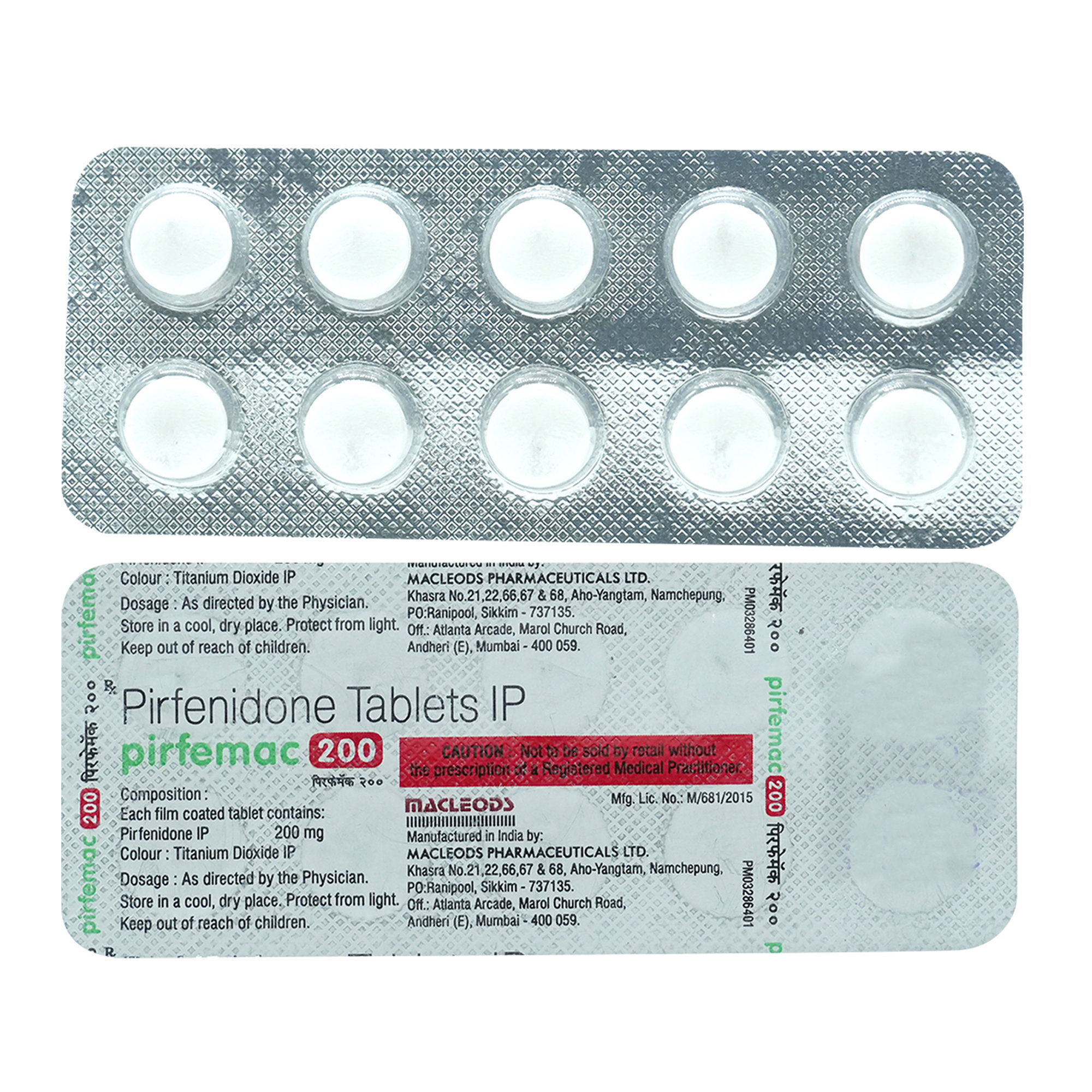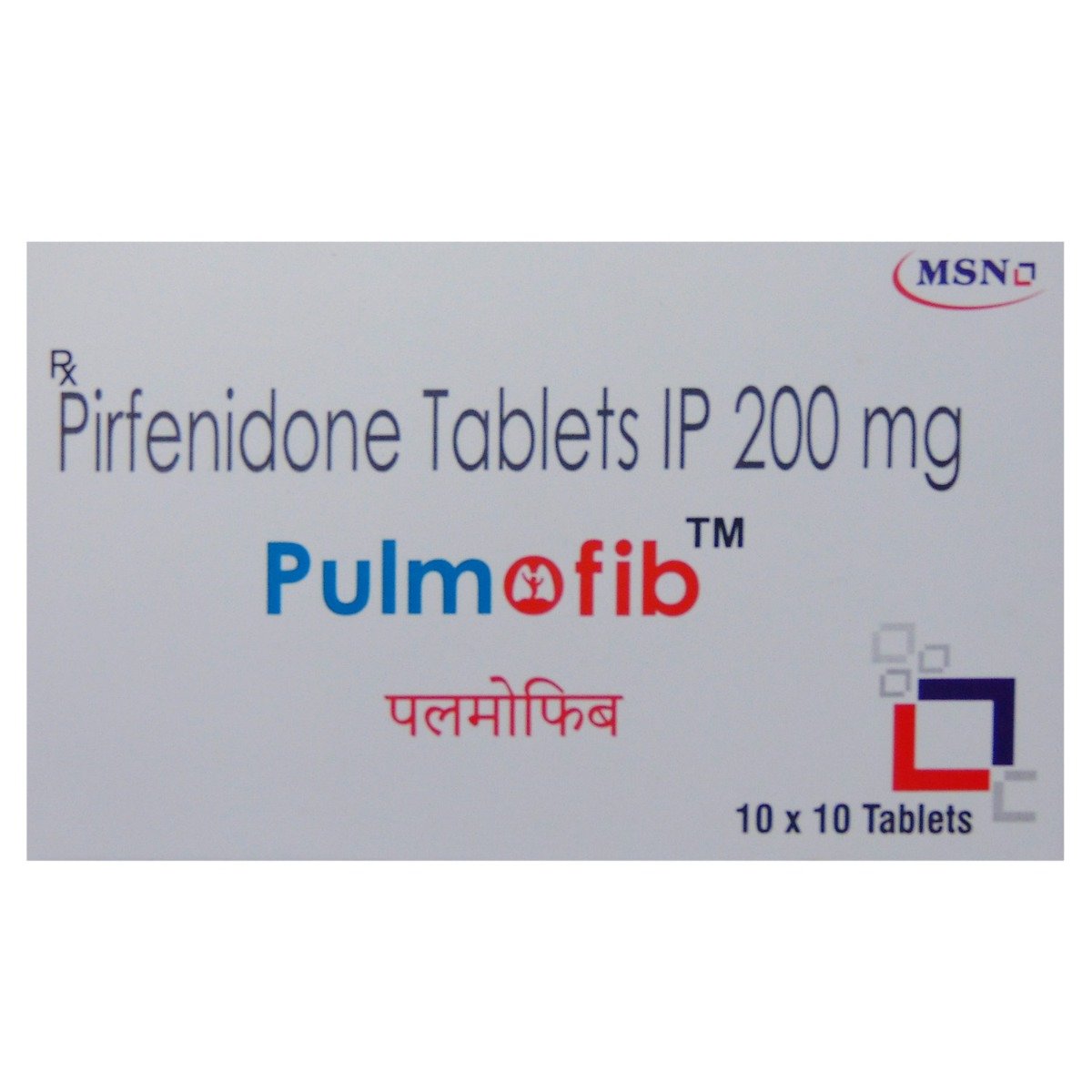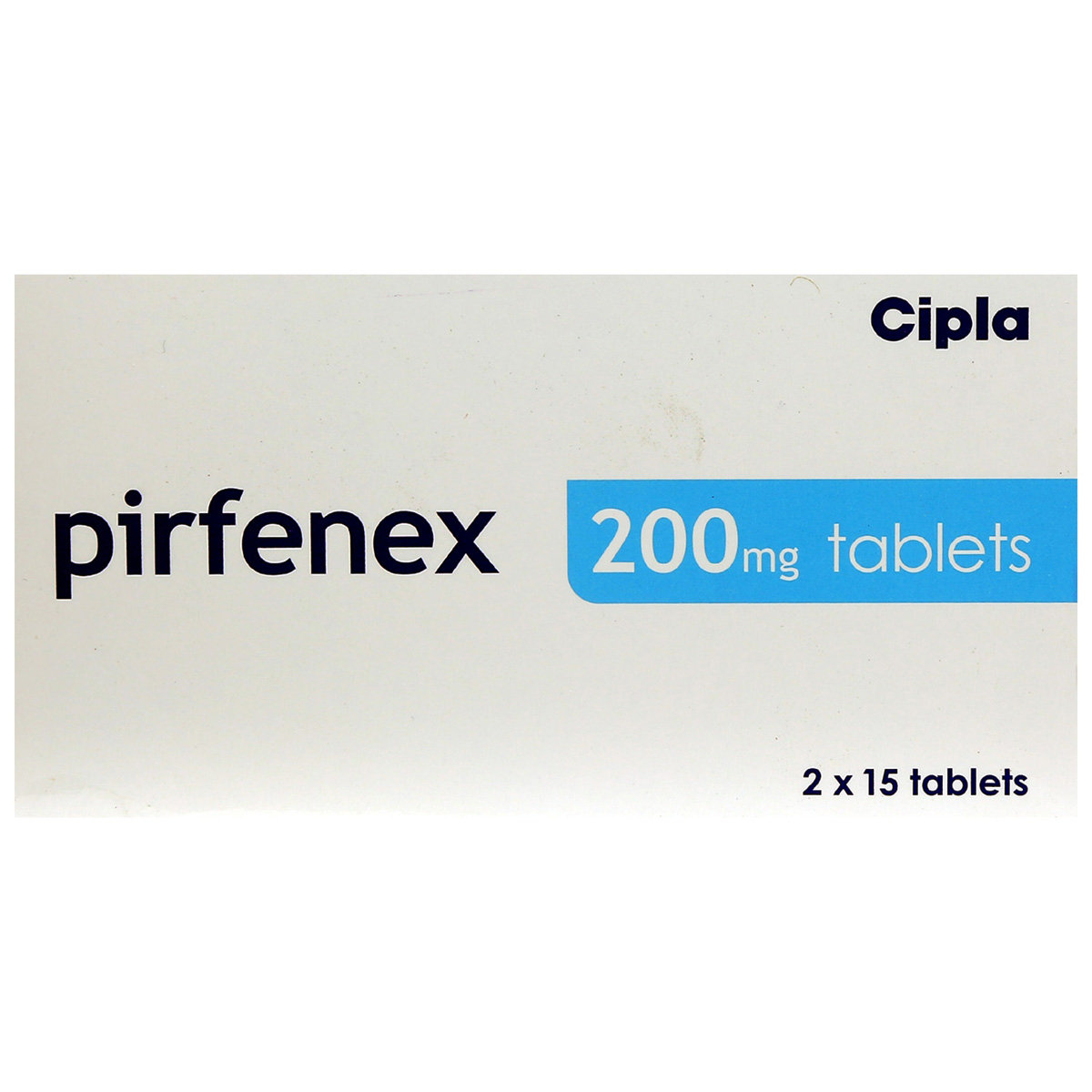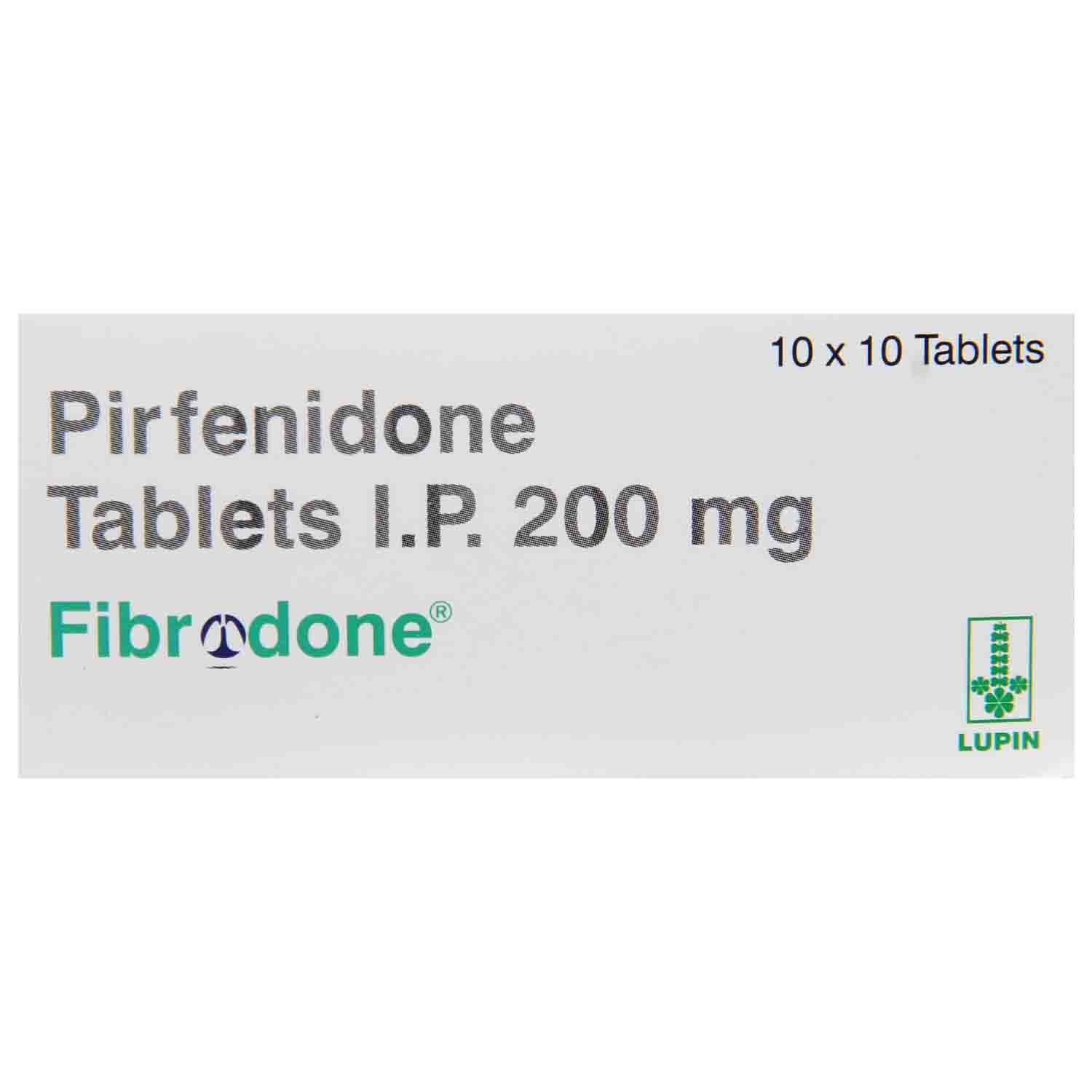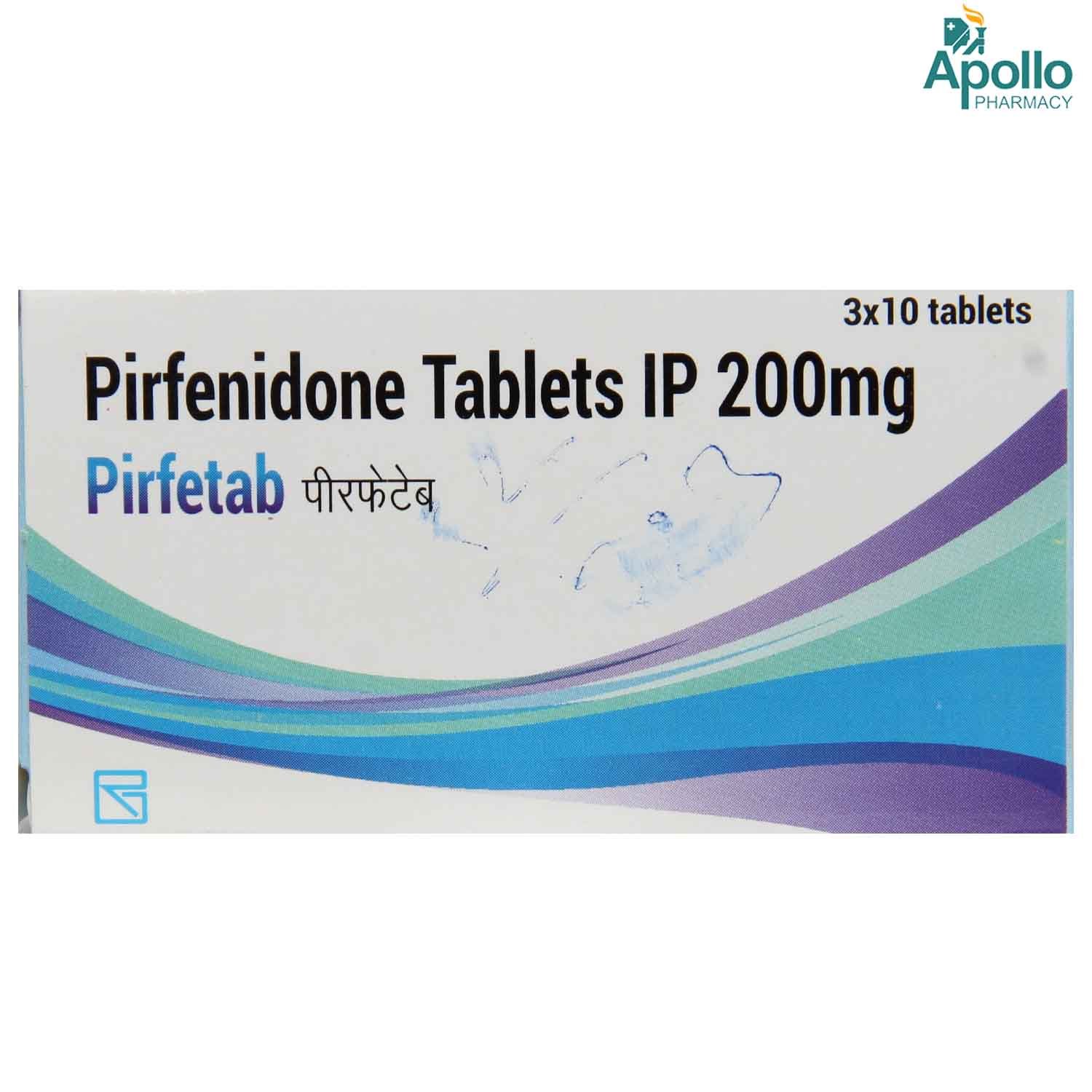- Home
- Prifedon 200 mg Tablet 10's
Prifedon 200 mg Tablet 10's Substitute
Prifedon 200 mg Tablet 10's Substitute
Medicine Composition:
PIRFENIDONE-200MGAll Substitutes & Brand Comparisons
RX
Out of StockPirfemac 200mg Tablet 10's
Macleods Pharmaceuticals Ltd
₹151
(₹13.59 per unit)
52% CHEAPERRX
Out of StockPirfenair 200mg Tablet 10's
Wockhardt Ltd
₹175
(₹15.75 per unit)
44% CHEAPERRX
Out of StockPirfib 200Mg Tablet 10'S
Chemo Healthcare Pvt Ltd
₹210
(₹18.9 per unit)
33% CHEAPERRX
Out of StockPalsa 200 Tablet 10's
Trion Pharma India Llp
₹219
(₹19.71 per unit)
30% CHEAPERRX
Pulmofib 200 mg Tablet 10's
Msn Laboratories Pvt Ltd
₹229
(₹20.61 per unit)
27% CHEAPERRX
Out of StockFybro-200 Tablet 10's
Luckys Pharma
₹235
(₹21.15 per unit)
25% CHEAPERRX
Out of StockPirfowise 200 Tablet 10's
Trumac Healthcare
₹245
(₹22.05 per unit)
22% CHEAPERRX
Pirfetid 200 Tablet 10's
J B Chemicals & Pharmaceuticals Ltd
₹250
(₹22.5 per unit)
21% CHEAPERRX
Out of StockFiboresp Tablet 10's
Glenmark Pharmaceuticals Ltd
₹261
(₹23.49 per unit)
17% CHEAPERRX
Out of StockPirfeheal 200 Tablet 10's
Healing Pharma
₹250
(₹25.0 per unit)
12% CHEAPERRX
Pirfenex 200 mg Table 15's
Cipla Ltd
₹433
(₹25.98 per unit)
8% CHEAPERRX
Fibrodone Tablet 10's
Lupin Ltd
₹290.5
(₹26.15 per unit)
8% CHEAPERRX
Out of StockPirvac 200 mg Tablet 10's
Innovative Pharmaceuticals Pvt Ltd
₹295
(₹26.55 per unit)
6% CHEAPERRX
Pirfetab 200 Tablet 10's
Zydus Cadila
₹348.5
(₹31.37 per unit)
10% COSTLIERRX
Out of StockBeclindone 200 Tablet
Amazone Pharmaceuticals Pvt Ltd
₹480
(₹43.2 per unit)
51% COSTLIER

When Should You Consider Switching from Prifedon 200 mg Tablet 10's?
Patients may explore substitutes in the following scenarios:
- High monthly cost of Prifedon 200 mg Tablet 10's
- Non-availability in local pharmacies
- Generic recommendation by a doctor
- Side effects or better tolerability with alternatives
What to Know Before Switching
Before you switch from Prifedon 200 mg Tablet 10's to another medicine, here are some important points to keep in mind:
Same salt, different brands:
Most substitutes contain the same active ingredient - PIRFENIDONE-200MG, but the fillers, coating, or manufacturing quality may vary slightly.
Consult your doctor first:
Even if the salt is the same, your doctor can confirm if the substitute is right for your condition, dosage, and health history.
Watch out for allergies or reactions:
Some people may react differently to certain brands due to inactive ingredients. If you notice any side effects, inform your doctor immediately.
Price ≠ effectiveness:
A lower-priced substitute doesn't mean it's less effective. Many generic medicines work just as well as branded ones.
Check the dosage form and strength:
Always match the substitute’s strength (e.g., 5mg, 10mg) and form (tablet, capsule, syrup) with what your doctor prescribed.
Uses
Prifedon 200 mg Tablet 10's used in the treatment of Idiopathic pulmonary fibrosis. The detailed uses of Prifedon 200 mg Tablet 10's are as follows:
- Idiopathic Pulmonary Fibrosis (IPF) Treatment: Prifedon 200 mg Tablet 10's is used to treat idiopathic pulmonary fibrosis, a chronic and progressive lung disease, by slowing down disease progression.
- Anti-fibrotic and Anti-inflammatory Effects: Prifedon 200 mg Tablet 10's works by reducing fibrosis and inflammation in the lungs, helping to improve quality of life and reduce the risk of complications associated with IPF.
Medicinal Benefits
Prifedon 200 mg Tablet 10's is an anti-fibrotic medicine used to treat idiopathic pulmonary fibrosis (IPF) in adults. Prifedon 200 mg Tablet 10's can help effectively slow the rate of lung function decline by 50%. Prifedon 200 mg Tablet 10's helps reduce the scarring and swelling in the lungs by decreasing the release/activity of naturally occurring growth factors in the body, thereby helping you breathe better. Prifedon 200 mg Tablet 10's helps in slowing down the progress of idiopathic pulmonary fibrosis.
FAQs
The substitutes of Prifedon 200 mg Tablet 10's contain the same active salt(s) - PIRFENIDONE-200MG. However, they may differ in price, manufacturing quality, and inactive ingredients. Speak to your doctor to find a suitable option.
Switching to a generic substitute medicine in the place of Prifedon 200 mg Tablet 10's is often possible if it has the same salt, strength, and dosage form. But always check with your doctor before making any changes to your medication.
Generics versions of Prifedon 200 mg Tablet 10's are typically more affordable because they don’t include the original brand's research, development, and marketing costs. They contain the same active ingredient and are approved for safety and effectiveness.
Most people don’t notice any difference. However, some may react to different fillers or coatings. If you notice any unusual symptoms after switching, consult your doctor.
Make sure the new medicine has the same active salt, strength, dosage form. Always confirm the change with your doctor or pharmacist.
Substitutes of Prifedon 200 mg Tablet 10's meet the same safety and efficacy standards as Prifedon 200 mg Tablet 10's, but small differences in absorption or formulation can exist. A doctor can help you choose the right one for your needs.
Yes. Substitutes of Prifedon 200 mg Tablet 10's may vary in color, size, or shape due to differences in manufacturing and branding, but this does not affect how they work.
Yes, it’s generally safe to switch between multiple substitutes of Prifedon 200 mg Tablet 10's if they have the same salt and strength. However, always inform your doctor so they can monitor how your body responds.
Yes, many people safely use substitutes of Prifedon 200 mg Tablet 10's for long-term treatment. Just ensure it’s done under medical supervision.
If your symptoms stay under control or lab results remain stable, the substitute for Prifedon 200 mg Tablet 10's is likely working well. Regular follow-ups with your doctor are important.
Absolutely. Even with the same salt, small differences can affect how your body responds when switching from Prifedon 200 mg Tablet 10's to its substitute. Always consult your doctor before switching.
Prifedon 200 mg Tablet 10's is used to treat idiopathic pulmonary fibrosis (IPF) in adults. IPF is an irreversible disease that is marked by a progressive decline in lung function.
Prifedon 200 mg Tablet 10's helps in reducing the scarring and swelling in the lungs by decreasing the release/activity of naturally occurring growth factors in the body, thereby helps you breathe better.
Prifedon 200 mg Tablet 10's might make you photosensitive (sensitivity to sunlight). Avoid exposure to sunlight and sunlamps. Wear SPF 50+ sunscreen and protective clothing to reduce exposure to sunlight. Talk to your doctor if you are taking any medicines known to cause photosensitivity. If you notice any symptoms of photosensitivity, consult a doctor.
Do not discontinue Prifedon 200 mg Tablet 10's without consulting your doctor. To treat your condition effectually, continue taking Prifedon 200 mg Tablet 10's for as long as prescribed. Do not be reluctant to speak with your doctor if you experience any difficulty while taking Prifedon 200 mg Tablet 10's.
Diarrhoea might be a side-effect of Prifedon 200 mg Tablet 10's. Drink lots of fluids and eat non-spicy food if you experience diarrhoea. If you find blood in stools (tarry stools) or if you have severe diarrhoea, consult your doctor. Do not take anti-diarrheal medicine on your own.
No, avoid smoking prior to the start of the treatment and while taking Prifedon 200 mg Tablet 10's as smoking might alter the effectiveness of Prifedon 200 mg Tablet 10's.
Weight loss could occur due to loss of appetite. Maintain proper weight by eating healthy food. Your doctor might monitor your weight whilst taking Prifedon 200 mg Tablet 10's. Consult your doctor if you notice severe weight loss.
Prifedon 200 mg Tablet 10's is not recommended for children below 18 years as the safety and effectiveness have yet to be established.
Taking Prifedon 200 mg Tablet 10's on an empty stomach may cause stomach discomfort. So, take Prifedon 200 mg Tablet 10's with food. Swallow Prifedon 200 mg Tablet 10's as a whole with a glass of water; do not chew or crush it.
While taking Prifedon 200 mg Tablet 10's, your doctor will monitor you regularly for potential side effects. This includes checking your liver and kidney function, blood cell count, weight, and skin for any reactions. They will also perform eye exams and monitor your lung function. Regular check-ups are crucial to ensure safe treatment. Be sure to follow your doctor's instructions and attend all scheduled appointments.
Continuing treatment with Prifedon 200 mg Tablet 10's is crucial because it helps slow down the progression of idiopathic pulmonary fibrosis (IPF), reduces the risk of lung function decline, and manages symptoms like cough and shortness of breath. This helps improve your quality of life and keeps you active. Stopping treatment may lead to disease progression, so it's essential to stick with your treatment plan and consult your doctor for personalized advice.
Common side effects of Prifedon 200 mg Tablet 10's may include nausea, tiredness, diarrhoea, indigestion, loss of appetite, headache, and photosensitivity. Most of these side effects do not require medical attention and will resolve gradually over time. However, you are advised to talk to your doctor if you experience these side effects persistently.
No, Prifedon 200 mg Tablet 10's is not a steroid. It is an antifibrotic medication, which means it helps to reduce scarring (fibrosis) in the lungs. It reduces inflammation and slows the progression of idiopathic pulmonary fibrosis (IPF), a chronic lung disease. While steroids can be used to reduce inflammation, Pirfenidone is a specific medication designed to target fibrosis in the lungs and has a different mechanism of action.
Prifedon 200 mg Tablet 10's is right for you if you have idiopathic pulmonary fibrosis (IPF) and your doctor has prescribed it to slow down lung scarring and progression.
Do not discontinue Prifedon 200 mg Tablet 10's without consulting your doctor, even if your condition appears to be under control. Stopping the medication abruptly may lead to a resurgence of symptoms and a loss of progress made. Continue taking the medication as prescribed and only discontinue use under the guidance of your healthcare provider. Regular monitoring and adjustments to your treatment plan will help ensure the best possible management of your condition.
While taking Prifedon 200 mg Tablet 10's, be sure to avoid excessive sun exposure and use sunscreen to protect your skin. Quit smoking to ensure the medication works effectively and to improve your overall health. Also, refrain from taking other medications without consulting your doctor, as they may interact with Prifedon 200 mg Tablet 10's. Additionally, limit your consumption of grapefruit and grapefruit juice to minimize potential side effects. By following these guidelines, you can safely manage your treatment and optimize your health outcomes.
The survival rate of pulmonary fibrosis varies depending on several factors, including the patient's age, health, lifestyle, and the severity of the disease at diagnosis. According to the European Respiratory Society, the median overall survival time of patients with idiopathic pulmonary fibrosis (IPF) is 4.5 years. However, survival rates can vary significantly, with some patients living up to 10 years or more after diagnosis.
Buy best Respiratory System products by
Cipla Ltd
Glenmark Pharmaceuticals Ltd
Lupin Ltd
Alkem Laboratories Ltd
Sun Pharmaceutical Industries Ltd
Mankind Pharma Pvt Ltd
Macleods Pharmaceuticals Ltd
Zydus Healthcare Ltd
Leeford Healthcare Ltd
Dr Reddy's Laboratories Ltd
Zydus Cadila
Pristine Pearl Pharma Pvt Ltd
Abbott India Ltd
Intas Pharmaceuticals Ltd
Alembic Pharmaceuticals Ltd
German Remedies Ltd
Aristo Pharmaceuticals Pvt Ltd
Centaur Pharmaceuticals Pvt Ltd
Zuventus Healthcare Ltd
Wockhardt Ltd
Micro Labs Ltd
Koye Pharmaceuticals Pvt Ltd
Ipca Laboratories Ltd
GlaxoSmithKline Pharmaceuticals Ltd
Med Manor Organics Pvt Ltd
Seagull Pharmaceutical Pvt Ltd
Torque Pharmaceuticals Pvt Ltd
Blue Cross Laboratories Pvt Ltd
Medishri Healthcare Pvt Ltd
Yash Pharma Laboratories Pvt Ltd
Capital Pharma
Divine Savior Pvt Ltd
East West Pharma India Pvt Ltd
Fourrts India Laboratories Pvt Ltd
Indiabulls Pharmaceuticals Pvt Ltd
Tablets India Ltd
Uniza Healthcare Llp
Adonis Laboratories Pvt Ltd
FDC Ltd
Shreya Life Sciences Pvt Ltd
Corona Remedies Pvt Ltd
Indoco Remedies Ltd
J B Chemicals & Pharmaceuticals Ltd
Unipark Biotech Pvt Ltd
Vasu Organics Pvt Ltd
Intra Life Pvt Ltd
Wings Pharmacuticals Pvt Ltd
Best Biotech
Biological E Ltd
Skn Organics Pvt Ltd
Wanbury Ltd
Apex Laboratories Pvt Ltd
Entod Pharmaceuticals Ltd
Eysys Pharmaceutical Pvt Ltd
Gene Lifecare
Healthgate Pvt Ltd
Icarus Health Care Pvt Ltd
Innoglide Pharmaceuticals Pvt Ltd
Navil Laboratories Pvt Ltd
Stedman Pharmaceuticals Pvt Ltd
Zee Laboratories Ltd
Comed Chemicals Ltd
Lincoln Pharmaceuticals Ltd
Megma Healthcare Pvt Ltd
Precept Pharma
Stryker Pharma Pvt Ltd
Torrent Pharmaceuticals Ltd
Bacans Biotech Pvt Ltd
Dolvis Bio Pharma Pvt Ltd
Elder Pharmaceuticals Ltd
Emcee Pharmaceuticals (P) Ltd
Geno Pharmaceuticals Pvt Ltd
La Renon Healthcare Pvt Ltd
Pfizer Ltd
Prevego Healthcare & Research Pvt Ltd
Sanatra Healthcare Ltd
Timon Pharmaceuticals Pvt Ltd
Balin Healthcare Pvt Ltd
Brinton Pharmaceuticals Ltd
Embiotic Laboratories (P) Ltd
Heal (India) Laboratories Pvt Ltd
Incite Pharmaceuticals
Kepler Healthcare Pvt Ltd
Modi Mundipharma Pvt Ltd
RPG Life Sciences Ltd
Wellok Pharma
Yuventis Pharmaceuticals
Aar Ess Remedies Pvt Ltd
Aglowmed Pharmaceuticals Ltd
Cadila Pharmaceuticals Ltd
Chemo Healthcare Pvt Ltd
Flaring Formulations Pvt Ltd
Foregen Healthcare Ltd
Hibiscus Pharmaceuticals Pvt Ltd
Honest Care Pharmaceuticals
JP Life Science Pvt Ltd
Knoll Pharmaceuticals Ltd
Laborate Pharmaceuticals India Ltd
Rnd Laboratories Pvt Ltd
Silver Cross Medisciences Pvt Ltd

